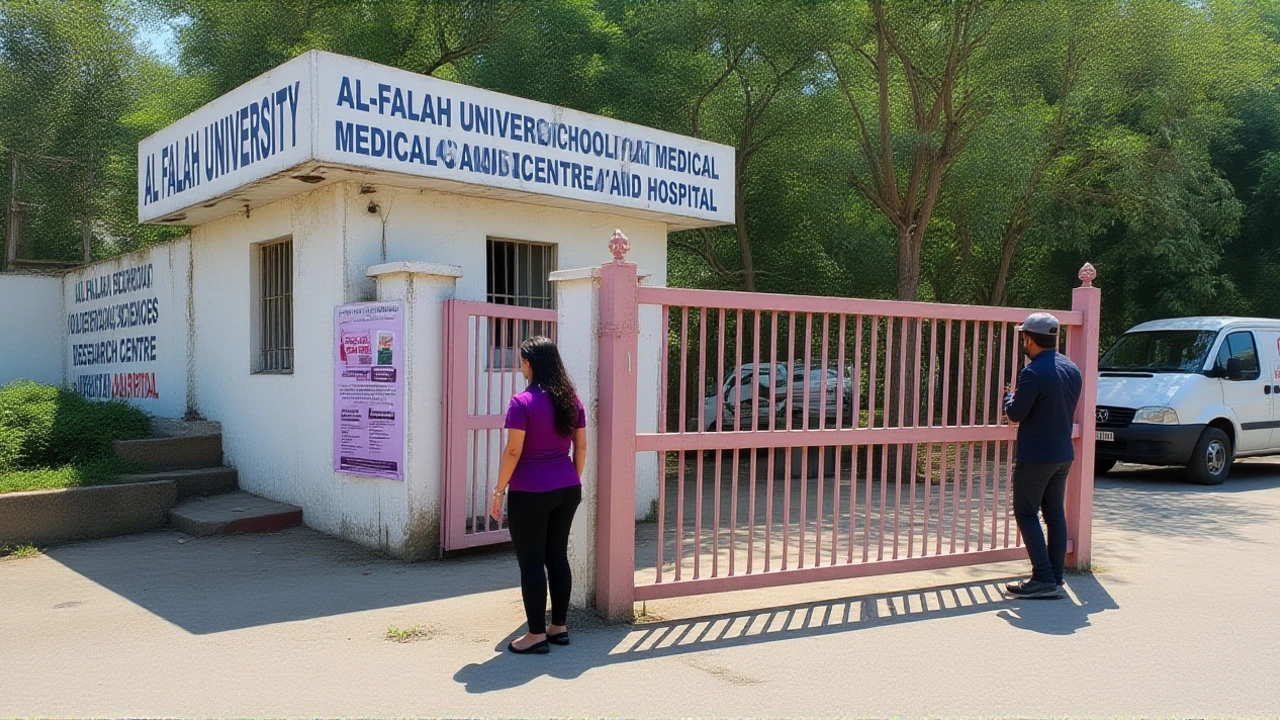When Al-Falah University in Faridabad posted outdated 'A grade' accreditation claims on its website, it didn’t just make a typo — it triggered a cascade of investigations that now threaten its very existence. The National Assessment and Accreditation Council (NAAC) issued a show-cause notice on November 12, 2025, accusing the university of misleading students and parents by falsely claiming accreditation status for its engineering and education colleges that had expired in 2018 and 2016. The university responded within days, admitting the claims were a 'designing error' — a phrase that sounds like an IT glitch, not a breach of public trust. But here’s the thing: this wasn’t an isolated mistake. It was the tip of a much larger iceberg.
Accreditation Lies and a System-Wide Crackdown
NAAC certifications last five years — no more, no less. Al-Falah’s website still displayed 2011 and 2013 ratings as if they were current, even though those credentials had lapsed nearly a decade ago. That’s not a web developer’s oversight. That’s a pattern. And NAAC isn’t playing around. Officials told Hindustan Times that roughly 25 other institutions across India have received identical notices as part of a broader push for transparency. This isn’t about punishing one school — it’s about resetting the rules for the entire higher education system. Parents pay tens of lakhs for degrees they believe are validated. When those validations are faked, the entire system loses credibility.Al-Falah’s management claims they fixed the website immediately after the notice. They apologized. They even issued a statement through Dainik Jagran saying the error was unintentional. But credibility doesn’t reset with a webpage update. The real question isn’t whether they corrected the site — it’s why the error existed for so long, and who approved it.
Delhi Blast Ties and the Minority Status Crisis
Then came the Delhi blast. A car driven by terror suspect Dr. Umar exploded near a crowded market, killing over 15 people. Investigations quickly revealed that two individuals linked to the attack had been employed at Al-Falah Medical College, a unit of the larger university. That’s when the National Commission for Minority Educational Institutions (NCMEI) stepped in. On November 20, 2025, they issued a show-cause notice demanding the university justify why its minority status — which grants it special autonomy and funding privileges — shouldn’t be revoked.The hearing is set for December 4, 2025. NCMEI isn’t just asking for documents. They’re asking: How can an institution tied to terror-linked employees still qualify as a minority educational body? The legal logic is razor-sharp. Minority institutions are protected under Article 30 of the Constitution, but they’re also held to higher ethical standards. This isn’t about religion — it’s about accountability.
Financial Scrutiny and the ED’s Shadow
While parents were lining up outside the university gates in Faridabad on November 22, 2025, demanding answers, the Enforcement Directorate (ED) was already inside Al-Falah’s offices, seizing financial records. Sources say the probe is focused on suspicious fund transfers, fake payroll entries, and inflated infrastructure claims. The university’s annual reports listed state-of-the-art labs and research centers — but audits suggest many were never built. One former faculty member, speaking anonymously, said: “We were told to sign off on documents we’d never seen. It was all smoke and mirrors.”Meanwhile, the Association of Indian Universities (AIU) quietly removed Al-Falah from its membership list. That means its degrees can no longer be recognized by other member institutions — a quiet but devastating blow to students seeking higher studies abroad or in top Indian universities.

Students Left in Limbo
More than 1,000 students, mostly MBBS candidates, gathered at the campus on November 22, 2025, with parents holding signs: “We Paid for Education, Not a Scam.” The Vice-Chancellor assured them the university wouldn’t shut down. “Conditions will gradually return to normal,” he said. But what does that even mean? If NAAC revokes recognition, if NCMEI strips minority status, if ED files charges — who will validate their degrees? Who will hire them?One 21-year-old medical student, Priya Mehta, told reporters: “I came here because Al-Falah was listed as NAAC A-grade. I thought I was getting a top-tier education. Now I’m terrified my degree is worthless.” Her fear isn’t irrational. In 2023, the UGC derecognized 17 private colleges after similar accreditation frauds. Their students had to retake exams or transfer — at their own cost.
What Comes Next?
The next 30 days will be decisive. By December 4, 2025, NCMEI will decide whether to revoke minority status. NAAC will recommend to the UGC whether recognition should be suspended. The ED could file charges as early as January. And the students? They’re stuck in bureaucratic purgatory.Al-Falah’s leadership claims this is all a misunderstanding. But when multiple agencies — NAAC, NCMEI, ED, AIU — all raise red flags at once, it’s not a coincidence. It’s a pattern. And in higher education, where trust is the only currency, that pattern may be fatal.
Frequently Asked Questions
Can Al-Falah University still award valid degrees?
As of now, yes — but only if the UGC doesn’t act on NAAC’s recommendation. The university remains legally recognized until formal derecognition occurs, which could take weeks or months. However, many employers and graduate schools now treat its degrees with skepticism, especially after AIU’s withdrawal. Students may face hurdles in licensing, internships, or abroad admissions.
Why does NCMEI’s minority status matter so much?
Minority status allows institutions to reserve seats, receive state aid, and operate with autonomy from UGC regulations. Losing it means Al-Falah loses funding, admissions flexibility, and legal protections. More critically, it signals to regulators that the institution may have used minority status as a shield for misconduct — a serious violation of the Constitution’s intent.
How common are fake accreditation claims in Indian universities?
Surprisingly common. Between 2020 and 2025, NAAC issued over 120 show-cause notices for expired or falsified accreditation claims. Many private institutions, especially in Haryana, Uttar Pradesh, and Rajasthan, have been caught inflating ratings to attract fee-paying students. The 25 current cases against Al-Falah are part of a coordinated audit — not random enforcement.
What should students enrolled at Al-Falah do now?
Students should immediately document all communications, retain fee receipts, and contact the UGC’s student grievance portal. Those in medical programs should consult the National Medical Commission about transfer options. Legal aid NGOs like the Indian Law Institute are offering free consultations. Delaying action could mean losing eligibility for future transfers or recognition.
Could Al-Falah University survive this scandal?
Only with drastic change: a complete leadership overhaul, full financial transparency, and voluntary surrender of minority status to rebuild trust. But with the ED investigation ongoing and public confidence shattered, even a perfect response may be too late. The real question isn’t whether they can survive — it’s whether anyone will still believe them.
Is there a precedent for an institution recovering from this level of scrutiny?
Yes — but rarely. In 2020, Symbiosis International School in Pune faced similar fraud allegations and lost NAAC accreditation. It rebuilt by inviting third-party audits, firing implicated staff, and publicly apologizing. It took four years. Al-Falah lacks Symbiosis’s brand equity and public goodwill. Without radical transparency, it’s unlikely to recover.

